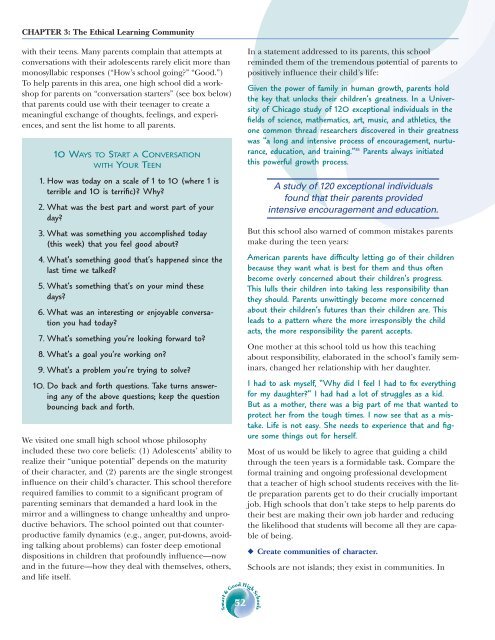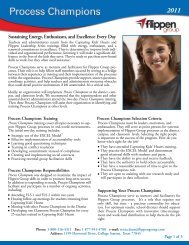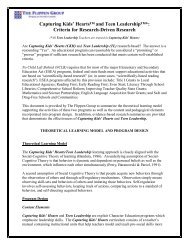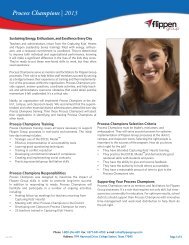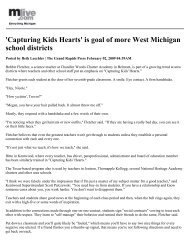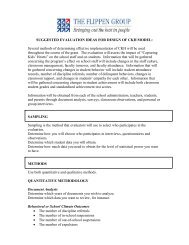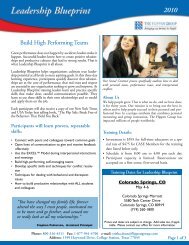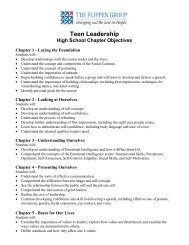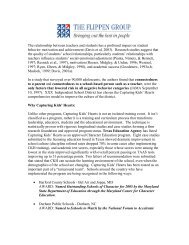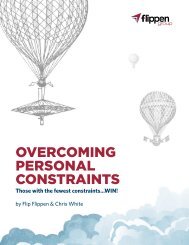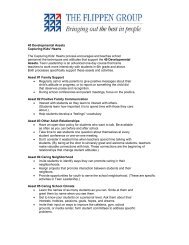Smart & Good High Schools - The Flippen Group
Smart & Good High Schools - The Flippen Group
Smart & Good High Schools - The Flippen Group
- No tags were found...
Create successful ePaper yourself
Turn your PDF publications into a flip-book with our unique Google optimized e-Paper software.
CHAPTER 3: <strong>The</strong> Ethical Learning Communitywith their teens. Many parents complain that attempts atconversations with their adolescents rarely elicit more thanmonosyllabic responses (“How’s school going?” “<strong>Good</strong>.”)To help parents in this area, one high school did a workshopfor parents on “conversation starters” (see box below)that parents could use with their teenager to create ameaningful exchange of thoughts, feelings, and experiences,and sent the list home to all parents.10 WAYS TO START A CONVERSATIONWITH YOUR TEEN1. How was today on a scale of 1 to 10 (where 1 isterrible and 10 is terrific)? Why?2. What was the best part and worst part of yourday?3. What was something you accomplished today(this week) that you feel good about?4. What’s something good that’s happened since thelast time we talked?5. What’s something that’s on your mind thesedays?6. What was an interesting or enjoyable conversationyou had today?7. What’s something you’re looking forward to?8. What’s a goal you’re working on?9. What’s a problem you’re trying to solve?10. Do back and forth questions. Take turns answeringany of the above questions; keep the questionbouncing back and forth.We visited one small high school whose philosophyincluded these two core beliefs: (1) Adolescents’ ability torealize their “unique potential” depends on the maturityof their character, and (2) parents are the single strongestinfluence on their child’s character. This school thereforerequired families to commit to a significant program ofparenting seminars that demanded a hard look in themirror and a willingness to change unhealthy and unproductivebehaviors. <strong>The</strong> school pointed out that counterproductivefamily dynamics (e.g., anger, put-downs, avoidingtalking about problems) can foster deep emotionaldispositions in children that profoundly influence—nowand in the future—how they deal with themselves, others,and life itself.In a statement addressed to its parents, this schoolreminded them of the tremendous potential of parents topositively influence their child’s life:Given the power of family in human growth, parents holdthe key that unlocks their children’s greatness. In a Universityof Chicago study of 120 exceptional individuals in thefields of science, mathematics, art, music, and athletics, theone common thread researchers discovered in their greatnesswas “a long and intensive process of encouragement, nurturance,education, and training.” 38 Parents always initiatedthis powerful growth process.A study of 120 exceptional individualsfound that their parents providedintensive encouragement and education.But this school also warned of common mistakes parentsmake during the teen years:American parents have difficulty letting go of their childrenbecause they want what is best for them and thus oftenbecome overly concerned about their children’s progress.This lulls their children into taking less responsibility thanthey should. Parents unwittingly become more concernedabout their children’s futures than their children are. Thisleads to a pattern where the more irresponsibly the childacts, the more responsibility the parent accepts.One mother at this school told us how this teachingabout responsibility, elaborated in the school’s family seminars,changed her relationship with her daughter.I had to ask myself, “Why did I feel I had to fix everythingfor my daughter?” I had had a lot of struggles as a kid.But as a mother, there was a big part of me that wanted toprotect her from the tough times. I now see that as a mistake.Life is not easy. She needs to experience that and figuresome things out for herself.Most of us would be likely to agree that guiding a childthrough the teen years is a formidable task. Compare theformal training and ongoing professional developmentthat a teacher of high school students receives with the littlepreparation parents get to do their crucially importantjob. <strong>High</strong> schools that don’t take steps to help parents dotheir best are making their own job harder and reducingthe likelihood that students will become all they are capableof being.◆ Create communities of character.<strong>Schools</strong> are not islands; they exist in communities. In52<strong>Smart</strong> & <strong>Good</strong> <strong>High</strong> <strong>Schools</strong>


